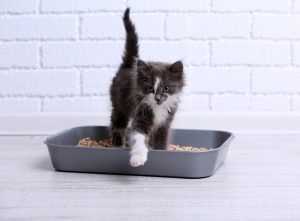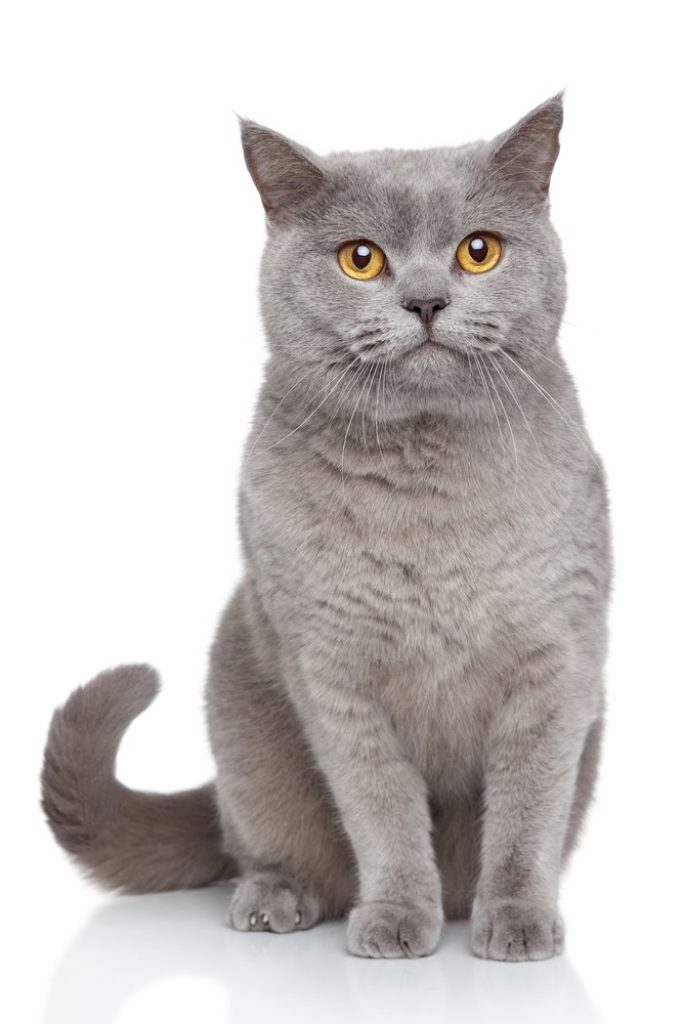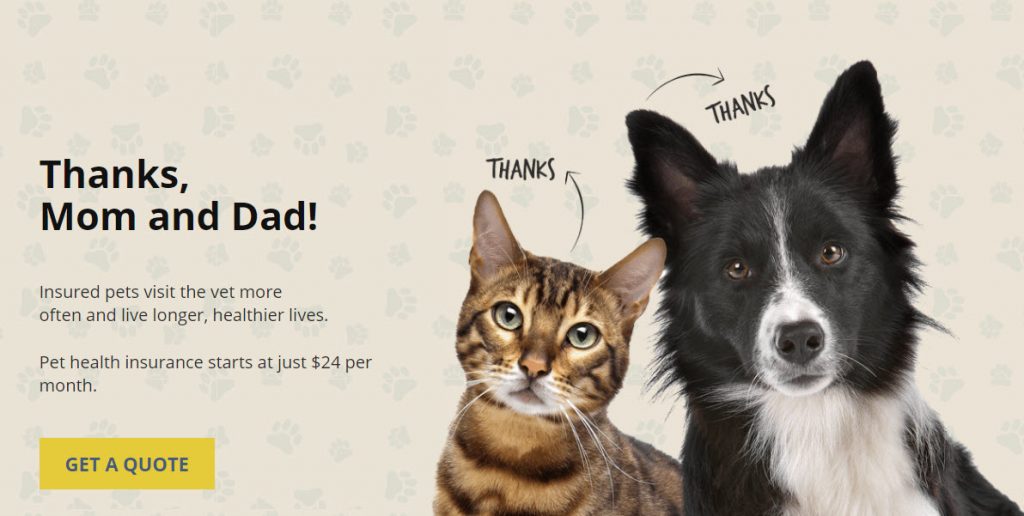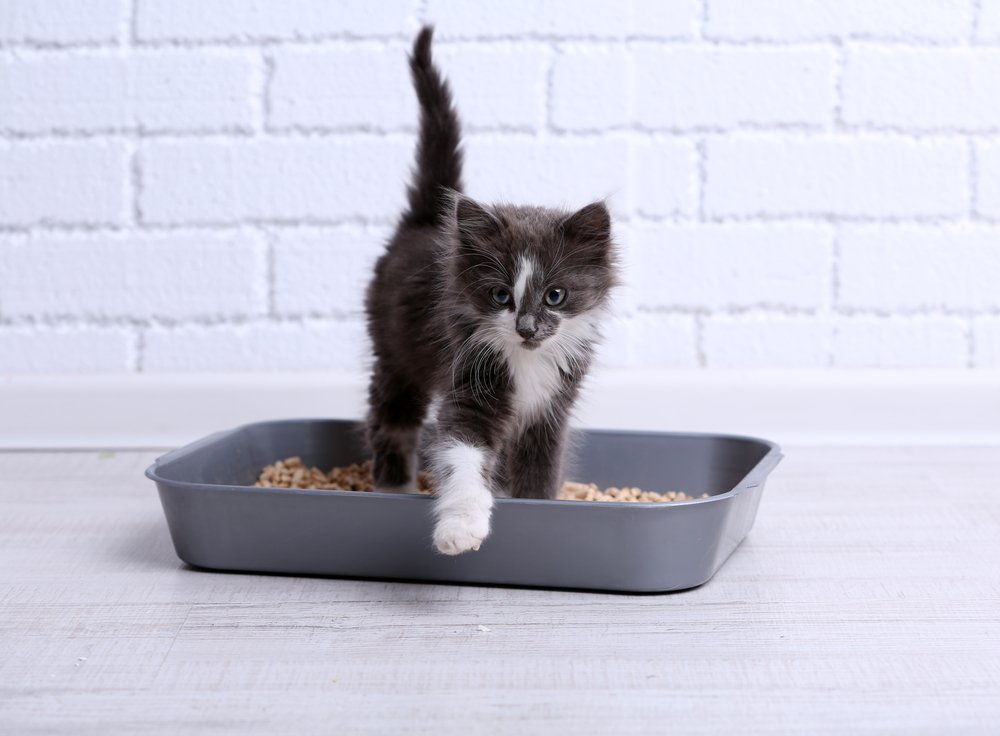Is Your Cat Peeing Outside The Litter Box?
Free Pet Insurance Comparison
Compare Quotes From Top Companies and Save
Secured with SHA-256 Encryption
Dr. Pippa Elliott BVMS, MRCVS
Veterinarian
Dr Pippa Elliott BVMS, MRCVS is a veterinarian with over 30 years of experience in companion animal practice. In 1987 she graduated from the University of Glasgow, with a degree in veterinary medicine and surgery. She works at Blythwood Vets and the People’s Dispensary for Sick Animals (PDSA). Pippa is an advocate of Fear-Free Practice, an animal addict, and a veterinary writer. She is also w...
Veterinarian
UPDATED: Feb 3, 2025
Pet Insurance U receives compensation from the third parties included on this site. This includes payment for clicks from our site to insurance providers’ sites and quote requests generated. Our rankings and reviews are not affected by payments from the insurance companies. The compensation we receive allows the site to be free and regularly updated. Our goal is to review every pet insurance provider, but not all companies are listed on the site.
And many of the companies we review do not pay us anything. We simply rate, compare and review their plan because we feel it will be valuable to you. Our reviews are guaranteed to be unbiased, professional and advertising compensation does not influence rankings.
We are a free online resource for anyone interested in learning more about pet insurance. Our goal is to be an objective, third-party resource for everything pet insurance related. We update our site regularly, and all content is reviewed by pet insurance experts.
UPDATED: Feb 3, 2025
Pet Insurance U receives compensation from the third parties included on this site. This includes payment for clicks from our site to insurance providers’ sites and quote requests generated. Our rankings and reviews are not affected by payments from the insurance companies. The compensation we receive allows the site to be free and regularly updated. Our goal is to review every pet insurance provider, but not all companies are listed on the site.
And many of the companies we review do not pay us anything. We simply rate, compare and review their plan because we feel it will be valuable to you. Our reviews are guaranteed to be unbiased, professional and advertising compensation does not influence rankings.
On This Page
Do your cat’s bathroom habits drive you crazy?
Cats peeing outside the litter box is a common problem which can happen for many reasons.
If your cat has taken up the habit, some detective work is required to get to the bottom of the problem and correct it.
Table of Contents:
Need Pet Insurance?
FACT: Pet insurance pays up to 90% of vet bills when your pet is sick or injured!
Why is My Cat Peeing Outside the Litter Box?
There are a number of reasons why your cat may be peeing outside the litter box. While it may just be that they don’t like their cat litter, it could also be a sign of a more serious health problem.
Health Problems

The first step is to work out if your cat has a health problem or if the issue is behavioral.
Think about the following questions:
- Is my cat drinking more? Increased thirst means the cat needs to empty his bladder more often, and they may not always be able to make it to the litter box.
- Is my cat losing weight? Weight loss can be a sign of health problems linked to increased thirst, such as diabetes, kidney disease or overactive thyroid glands.
- Is there blood in the urine? This can be a sign of infection or bladder stones.
- Urinating little and often? Small puddles and frequent urination are signs of bladder discomfort.
- Excessive grooming? If your cat spends an excessive amount of time washing his rear end, this can be a sign of urinary discomfort.
If you answered “Yes” to any of the above, the problem may be physical, not mental, and a vet checkup is essential.
Indeed, any cat that pees inappropriately should first see a vet to check for physical problems.
Your vet will reach a diagnosis by running some of the following tests:
- A physical exam: The vet checks the size and feel of the bladder for tenderness or discomfort
- Urine culture: A sample is sent for culture to check if bugs are present
- Urine analysis: Urine is spun down and the sediment looked at under a microscope to check for crystals which chaff the bladder lining
- Ultrasound exam: A bladder scan to rule out stones, polyps, or cancer
- Blood tests: Screening the cat for diabetes, overactive thyroid glands and kidney disease, which can lead to poor bladder control
Behavioral Problems
If the tests are normal or negative for any health issue, your cat has a behavioral problem.
Cats are fussy about their toilet facilities and easily put-off. Common reasons include:
- Not liking the cat litter
- The tray is too smelly
- Too many other cats use the same tray
- The tray is not private enough
- The cat was frightened while using the tray
- The cat experienced pain while on the tray
Enter your ZIP code below to view companies that have cheap pet insurance rates.
Secured with SHA-256 Encryption
8 Ways to Keep Your Cat from Peeing Outside the Litter Box
Use these 8 tips to improve your cat’s litter box behavior.
1. Try Different Cat Litters
Some cats prefer softer litter made of recycled paper, while others prefer the feel of a harder litter under their paws. Also, avoided scented cat litters as these offend a cat’s sensitive sense of smell.
2. Increase the Number of Trays
The golden rule is:
One tray per cat plus one extra. Having two cats means a minimum of three trays.
One of Your Cats Might Want His or Her Own Litterbox
Sometimes one or more cats in a household will control access to litter boxes and prevent the other cats from using them.
Even if one of the cats isn’t actually confronting the other cats in the litter box, any conflict between cats in a household can create enough stress to cause litter-box problems.
Related: 10 Things You Must Know Before You Buy Pet Insurance
3. More Frequent Cleaning
Scoop at least once a day; dump the entire contents once a week and wash the tray. This can also help reduce cat allergies.
4. Change Location of Litter Box
If you have multiple stories, put one litter box on each floor.
If your litter box is too tucked away, somewhere inconspicuous, your cat may not bother to go find it.
If your cat keeps peeing in the same spot despite your best efforts, try moving the litter box over that spot and then slowly moving it back to where you want it.
5. Quiet & Secure
Put the trays in quiet places where the cat has privacy.
Avoid placing trays next to a washing machine, which suddenly goes into a spin cycle and frightens the cat.
6. Treat Any Litter Box-Related Pain
Treat urine infections promptly so the cat doesn’t associate the pain of straining with the litter tray.
7. Deodorize Accidents
Clean up urinary accidents with an enzymatic cleaner to remove all traces of scent which could attract the cat back.
8. Pheromones
Using Feliway diffusers in the house helps a cat to relax and reduces stress-related spraying.
Real Cost Savings from PetFirst Clients

Gidget
PetFirst saved his parents
$2,194
Artemis was a beautiful and friendly cat to all who were willing to pet him. Unfortunately, he developed feline diabetes which required regular vet visits and medications that his Mother could not otherwise afford on her fixed income. Having PetFirst insurance, she called and discussed the problem with a friendly PetFirst agent. To her surprise, she found out that Artemis’ ongoing required vet visits and medication would be covered by his PetFirst insurance. Artemis was able to live out the rest of his life with proper medical care and medicines thanks to PetFirst insurance.
Stress Can Cause Litter Box Issues
Stress can cause litter-box problems. Cats can be stressed by events we wouldn’t think as traumatic.
Changes in things that even indirectly affect the cat, like moving, adding new pets or family members to your household—even changing your daily routine—can make your cat feel anxious.
Look around your home to think of anything that has changed that might be the source.
Even construction or a new kitty in another home can cause stress.
Final Thoughts on Cats Peeing Outside the Litter Box
Remember, any cat at any age can start peeing outside the box.
Distinguishing medical from behavioral causes is vital but can be costly.
Wise cat owners invest in pet insurance so their cats can receive prompt treatment and prevent peeing outside the litter box from becoming a habit.
Other articles you may find helpful:
Is Exotic Pet Insurance Necessary?
The Best Pet Insurance By State
Fun Facts, Dog FAQ, And Unsolicited Dog Advice
5 Training Commands to Save Your Dog’s Life
The Ultimate Guide to Safe Foods for Dogs
We have worked hard to provide you with all the free resources possible to help give you insight into the best pet insurance for cats, additional cat breeds info, common cat health issues, and a fun look at frequently asked cat questions.
Other Frequently asked cat questions and some unsolicited catty advice…
Why your cat ignores you when you call it?
How to stop your cat from scratching the carpet?
Can you make a feral cat a pet?
Why does my cat pee outside the litter box?
Why do people walk their cats on a leash?
4 Ways to prepare for a new kitten
10 hidden hazards for indoor cats
Why changing your cat’s food is risky


Frequently Asked Questions
Why is my cat peeing outside the litter box?
Cats may pee outside the litter box for various reasons, including health problems or behavioral issues. It’s essential to identify the cause, which may require a vet checkup.
What health problems could lead to inappropriate peeing?
Health problems such as urinary tract infections, kidney issues, or diabetes could lead to inappropriate peeing. If your cat exhibits signs like frequent urination or blood in urine, consult a vet.
How can I determine if it’s a health or behavioral issue?
Answering questions about changes in behavior, litter preference, and any signs of pain can help distinguish between health and behavioral issues. If unsure, consult a vet for proper diagnosis.
What behavioral issues might cause a cat to pee outside the litter box?
Behavioral issues include stress, territorial conflicts, or dissatisfaction with the litter box. Cats may react to changes in their environment, routine, or the presence of other pets.
How can I prevent my cat from peeing outside the litter box?
Consider trying different cat litters, maintaining cleanliness, providing multiple litter boxes, and placing them in quiet, secure locations. Addressing stress through pheromones or veterinary guidance may also help.
When should I consult a vet about my cat’s inappropriate peeing?
If you observe any behavioral or health-related signs, consult a vet promptly. Tests and examinations can help identify and address the underlying cause, ensuring timely treatment.
Can pet insurance help cover veterinary costs for such issues?
Yes, pet insurance can be valuable in covering veterinary costs for health issues. Investing in pet insurance early can provide financial support for unexpected medical expenses.
How does stress contribute to litter box issues?
Cats can react to stress from changes in the home, routine, or the presence of other animals. Identifying and minimizing stressors, along with providing a comfortable environment, can help prevent litter box problems.
What are some signs of stress in cats?
Signs of stress in cats may include changes in eating habits, excessive grooming, hiding, aggression, or inappropriate urination. Understanding these signs can help address stress-related litter box issues.
Is it common for cats to develop litter box problems at any age?
Yes, cats at any age can develop litter box problems. Understanding the potential causes and addressing them promptly, including seeking veterinary advice, can prevent such issues from becoming habits.
Enter your ZIP code below to view companies that have cheap pet insurance rates.
Secured with SHA-256 Encryption
Dr. Pippa Elliott BVMS, MRCVS
Veterinarian
Dr Pippa Elliott BVMS, MRCVS is a veterinarian with over 30 years of experience in companion animal practice. In 1987 she graduated from the University of Glasgow, with a degree in veterinary medicine and surgery. She works at Blythwood Vets and the People’s Dispensary for Sick Animals (PDSA). Pippa is an advocate of Fear-Free Practice, an animal addict, and a veterinary writer. She is also w...
Veterinarian
We are a free online resource for anyone interested in learning more about pet insurance. Our goal is to be an objective, third-party resource for everything pet insurance related. We update our site regularly, and all content is reviewed by pet insurance experts.


